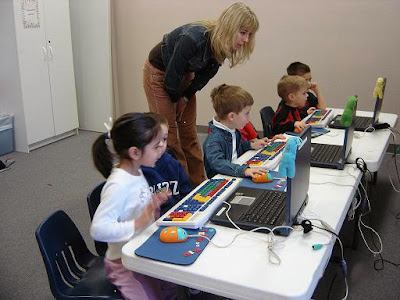Protecting children from cyber predators
 |
| Kids learning computer operations. Photo: tech-kidz.com |
Reason? Parents, especially those who are always busy at work, may not have the time to be always on guard when their minor children are given access to the internet at home. But is this possible? It depends.
One thing any concerned parent must do is to regulate or impose discipline among their children in the use of the internet at home is to introduce a password that only one of the parents should have access to. In this way, children who are doing their research assignments in the internet should have the leeway to veer away from what they're researching about by stumbling on a pornographic materials that will accidentally pop out in the computer screen. Any computer for that matter is installed with a pop-out blocker which can be turn OFF and ON, depending on who is using the computer. This means that when the POP-OUT BLOCKER is ON, unncessary advertisements will automatically come out on the computer screen thus awakeing the curiosity of children.
Intended for huge profits, pornographic materials have invaded cyber space. At this writing, its bounds are limitless so that anybody, including innocent children, is exposed to violent or pornographic materials, which could somehow influence their behavior at home or in school. For example, the many cases of bullying has been identified as one of the negative results of children exposed to violent games in the internet. Sadly, some of these have resulted in suicides.
Parallel to this, sinister individuals like the pedophiles are always on the lookout for pornographic materials that use children as virtual performers. And most of these incidents happen in countries where poverty incidence is beyond comprehension. There are cases when poor parents, who are yearning to earn foreign
currencies, are tempted to expose their children for profits. They make as a form of livelihood by allowing their children to do some sexual acts on the internet thereby inviting pedophiles around the world to take advantage of it in exchange for certain fees, wihch are remitted either through the underground or regular
financial channels.
Consequently, cause-oriented organizations had been alerted by these negative developments. But how can the innocent children be protected in cyber space? There are mixed reactions to this question, depending on the political and economic situation of a particular country. Of course, cyber crime laws are put in place. However, the extent and complexity by which the business of pornography works have not been fully regulated thereby making it more difficult for law enforcers to arrest those who have been suspected of using children to perform lewd acts in the internet.
In a broadcast interview with Talkback's anchor Tina Monson Palma at ANC, Atty. JJ Disini had suggested the tapping of the village officials in the monitoring of illegal activities within their community. The recent arrest by law enforcers in Cebu province of a family that used its children to render sexual acts on video, which was uploaded in the internet for the world to see, had elicited different reactions from people. But one of the reasons that came up in the course of investigation was purely economics. There are still parents, who, out of their hopelessness to survive, have come up with a sinister idea to exploit their children for profits.
Disini said that the problem right now is that it is difficult to prevent this malady for the simple reason that telecommunications companies just don't allow law enforcement agencies to dip into their data without any order from the court. Until the court has issued a search order for law enforcers to harvest data from
their hardrives, arresting the suspects is not that easy. at all. According to Disini, the court needs probable cause that a certain crime is being committed in a particular area.
Atty. Trisha Oco , executive director of the Juvenile Justice and Welfare Council in the Philippines, said that pornographic exploitation of children has become a cottage industry. She added that even if the intention is only to show the lewd acts without touching, it could still be considered as immoral acts that could destroy the children's future.
Cyber experts have argued that concerned governments must do something to block internet providers from showing pornographic materials in the internet. As to how they will do it is something that still puzzles a lot of people knowing how complicated the cyber space is.
Mario Armstrong, a technology commentator for the National Public Radio in Baltimore, said: " Parents, if you're listening, you should take this down. There is a website that I want to share with you called Net Lingo. That's N-E-T Lingo.com, L-I-N-G-O. Kids get mad when I mention this site because it explains all of the
acronyms and all of the vernacular that's happening in this online world."
Armstrong adds: "So if you walk up to your son or daughter's computer and they're in the middle of a chat discussion or an instant message and you see the letters P-O-S show up on the screen, that stands for parent over shoulder. That signals other people in the chat room change the discussion. Let's talk about
homework. Let's not talk about sex or other things that you may find disturbing."
Likewise, he suggested to parents to access wiredsafety.org. "It's a great site full of tools, especially for those that are really trying to get the basics, understand all of the potential dangers and pitfalls. And then another one is called teenangels.com."


Comments